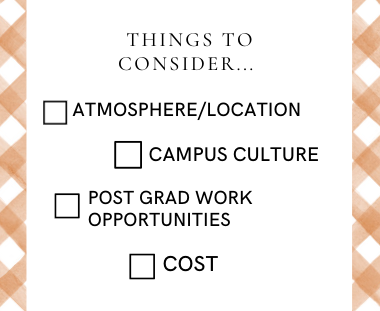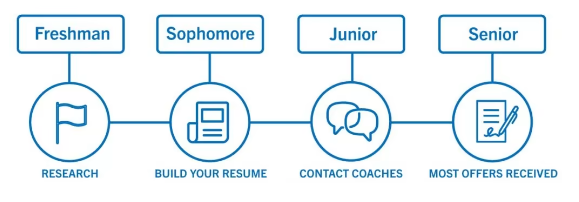The recruiting process is one of the toughest things an athlete will endure if they want to play their sport collegiately. The pressure to perform is already high without the pressure to commit to play a D1 sport. I personally have gone through the ringer multiple times because of this process and am still currently doing everything in my power to overcome the struggles that come along with it.
Top 5 Things to Consider:
Stress is something that is inevitable with the recruiting process, however there are ways to minimize the fallout. Making a plan prior to when colleges can reach out to you is crucial to prevent unnecessary stressors. The NCSA is a great resource to use to map our your process. The Top 5 things you should focus on the following:
- Finding a college that you’d enjoy being at without the sport
Injuries are fairly common for athletes, it’s important to envision what your life would be like if you were to be benched. When talking with coaches, it’s appropriate to ask how they handle injuries. Some pull scholarships, some add a year of eligibility, and others just let them be completely until its healed.
- Finding a college with the major you’d want to pursue
Some schools are focused on medical majors, others on business, others on marine sciences depending on the location. Just because a school is making you an offer, doesn’t mean you need to change your interests to fit their academic focuses. For some sports, going pro is unlikely, but your career could last a lifetime so pick a school that aims you in the right direction when you graduate.

- Releasing the pressure of going to a D1 program, there are some fantastic D2’s and D3’s out there
It’s such a hard thing to get over sometimes, but D1 really isn’t for everyone. The practice hours and frequency are much higher than D2’s and D3’s, however D2’s and D3’s sometimes can keep up with (if not beat) some D1’s. Something that aided in my decision making was to take the division out of it, I focused on location, amount of money, and program type.
- Training schedule that fits you (won’t get worn out)
Again, practice and lift hours differ for each division. If you know you get burnt out quickly, you may want to re-evaluate what you’re committing yourself to, ask the coaches what a typical workout or week looks like for their program.
- Going to a school that can give you the money you need
Finances is a HUGE aspect of this process. If money plays a significant role in what college you’ll attend, it’s appropriate to ask coaches what academic and athletic scholarships they think you might get. A Faculty Additional Employment (FAE) form can be used also to make a ballpark range on what your financial aid could be, after a coach makes an offer you can ask if they use FAE forms and fill it out.
Steps to Follow:
If you are wondering how to get started with the recruiting process, its important to know that it is different for every sport, but usually you should have the following…
- A highlight reel (gather film from tournaments, parents, and/or coaches and put together your best clips that display your athletic ability). IMovie and CapCut are popular apps used to make reels, make sure to put clean music that you want representing yourself and your team.
- A sports specific email (this makes checking your email for coach’s emails much simpler, you are less likely to miss them when the only emails you are receiving are from coaches).

- A profile on socials or websites for your sport (it helps when coaches can go to one place to find your contact information, your coaches information, your highlight reel, and any other information they may want to consider).
- A recruiting coordinator (this one is a bit more optional, but it definitely helps. I used a coordinator after a while, but at the beginning I just used my coaches, both help a lot due to the fact that they may have relationships with the college coaches).
- Great social and academic skills (this is just a given, you are a student athlete, coaches won’t take you if you don’t show promise both academically and athletically. Having social skills helps when you have to make calls and write emails, no one wants to talk to someone who lacks empathy, maturity, or humor).
If you are struggling with the process, reach out to your coaches and teammates for help. You are definitely not alone in these struggles, but know that the work you put in will pay off in time. Stay consistent and whats meant to be will be, you got this!










